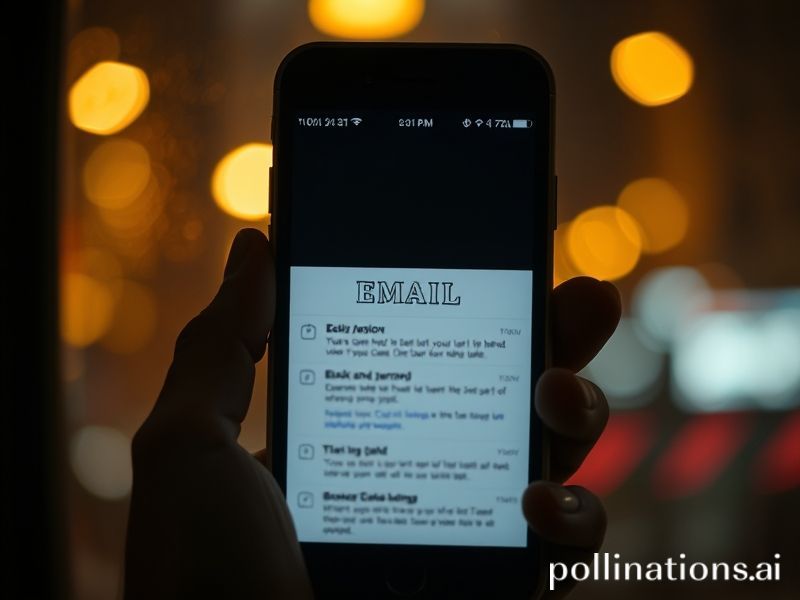Global Inbox of Doom: How Email Rules the World (and Our Inboxes) One Ransom Note at a Time
Somewhere over the mid-Atlantic, at 37,000 feet and cruising on autopilot, a Boeing 787 pings a satellite, which coughs the latest quarterly report into an inbox in São Paulo, which triggers an out-of-office reply written in three languages and decorated with a GIF of a cat wearing sunglasses. The passengers remain mercifully unaware that, in the cargo hold, 3.2 terabytes of pharmaceutical contracts are quietly duplicating themselves across four continents because one bored associate in Geneva hit “Reply All.” This, dear reader, is the modern miracle we call email: humanity’s most successful method of sending words to strangers while accidentally copying the entire species.
From Lagos server farms cooled by diesel generators to Icelandic data centers heated by volcanic vents, email has become the Esperanto of late-stage capitalism—spoken by all, mastered by none, and weaponized by the marketing department. The United Nations estimates that 347 billion messages scuttle across fiber-optic cables every day, roughly equal to every human on Earth sending a postcard to their dentist. Most of these missives are advertisements for erection pills and crypto conferences nobody asked to attend, but the rest constitute the circulatory system of global governance: trade confirmations, diplomatic démarches, ransom notes. When the undersea cable between Mombasa and Mumbai was severed last March by an unusually ambitious anchor, three hedge funds went into cardiac arrest, and a junior analyst in Nairobi was blamed for “not having a redundant VPN.” He now sells artisanal coffee and refuses to check his inbox, which passes for mental health in 2024.
Consider the geopolitics of the @ symbol. In China, email is tolerated the way one tolerates a cousin who shows up late to every wedding: necessary, slightly embarrassing, and best kept away from the microphone. The Great Firewall politely downgrades foreign attachments to 56k speeds, ensuring that any PDF longer than a haiku times out before it can corrupt socialist values. Meanwhile, the European Union—ever the hall monitor of the information age—has weaponized the humble subject line. Under GDPR Article 32b, the phrase “Quick Question” is now legally classified as psychological assault, punishable by a €20 million fine or two years of mandatory mindfulness retreats, whichever feels longer.
Not to be outdone, Russia’s state security services recently advised oligarchs to replace email with carrier pigeons, noting that birds can be grilled if negotiations fail. The pigeons, unionized and fluent in dark humor, promptly set up an out-of-office message: “Currently circling Cyprus. Will respond within 3–5 business days or when sanctions lift.”
Yet for all its absurdities, email remains the cockroach of communication protocols: ugly, indestructible, and destined to outlive the mammals. NGOs in Sudan coordinate famine relief with the same cc etiquette used by Manhattan law firms to argue over lunch reimbursements. Somewhere in Antarctica, a climate scientist receives a phishing attempt promising bigger glaciers if she clicks here; she forwards it to a colleague in Tasmania with the subject line “LOL, we’re doomed.” The loop completes itself.
Anthropologists studying digital fossils will one day unearth our inboxes and marvel at the sheer volume of apologies appended to messages that merely said “Thanks!” They will note that every civilization eventually invents a technology to say “per my last email” without actually saying it—Mayan glyphs, Roman tablets, Slack emojis—yet none ever cures the sender’s remorse. That, perhaps, is email’s true global legacy: not the transfer of information, but the transfer of anxiety at the speed of regret.
In conclusion, email is the world’s most successful experiment in voluntary self-surveillance, a planetary nervous system that hums with equal parts Viagra spam and nuclear launch codes. It has made borders porous, secrets porous, and attention spans colander-like. If the internet is a drunken dinner party, email is the guest who keeps refilling your glass while whispering tomorrow’s hangover. Raise a lukewarm mug of compliance training to it, then archive this message forever. You’ll need the storage for next quarter’s apology tour.







